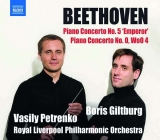Versuche, Beethovens Fünftes Klavierkonzert vom Empereur-Pathos zu befreien, hat es schon manche gegeben. Einige gerieten dabei so nüchtern, dass sie schon fast leb- bedeutungslos wurden. Boris Giltburg und Vasily Petrenko zeigen, wie man es richtig macht.
Giltburgs deutliche Diktion und Petrenkos klare Lesart lassen uns kompositorische Verläufe nachvollziehen, aber in dieser schönen Architektur und ihrem gepflegtem Interieur, kommt es immer wieder zu besonders schönen klanglichen Sensibilisierungen, zu einem sehr lebhaften, prickelnd wachen und immer spontan wirkenden Diskurs und vor allem auch einer reizvollen Kantabilität. Was Giltburg etwa im zweiten Satz an Nuancen produziert, an Stimmung schafft, ist schlicht ergreifend. Es ist ungemein quirlig und klar, detailreich und voller kleiner Verzierungen. Auch im Finale ist Giltburgs Artikulation bemerkenswert. Die haarscharfe Abgrenzung von dynamischen Werten, das frische, fast improvisatorisch wirkende Verteilen von Akzenten, all das zeugt von einer großen und reichen Spielkultur. Auch Petrenko und das Royal Liverpool Philharmonic dünnen die Musik nicht aus, so dass die prachtvolle Krönung der Beethovenschen Klavierkonzerte vollauf gelingt.
Das Klavierkonzert Nr. 0 schrieb Ludwig van Beethoven im Jahre 1784, im Alter von vierzehn Jahren. Auf der Titelseite der vom Komponisten angefertigten Reduktion für Soloklavier hat er freilich ‘agé de douze ans’ (im Alter von 12 Jahren) vermerkt. Eine Partitur von diesem Konzert gibt es nicht, lediglich eine handschriftliche Kopie des Klavierauszuges mit Anmerkungen und eben die Reduktion, die Boris Giltburg hier sehr inspiriert, spontan und stimmungsvoll spielt. Das zärtliche Larghetto und das virtuose Rondo sind jedes in seiner Art faszinierend.
There have been many attempts to free Beethoven’s Fifth Piano Concerto from the Empereur-pathos. Some of them turned out so sober that they became almost meaningless. Boris Giltburg and Vasily Petrenko show how to do it right.
Giltburg’s clear articulation and Petrenko’s transparent reading allow us to follow compositional structures, but in this beautiful architecture and its well-kept interior, there are always particularly beautiful tonal sensitivities, a very lively, sparklingly alert and always spontaneous discourse and, above all, a delightful cantabile. What Giltburg produces in nuances, in mood, in the second movement, for example, is simply moving. It is immensely lively and clear, rich in detail and full of small ornaments. In the finale, too, Giltburg’s articulation is remarkable. The hair-trigger delineation of dynamic values, the fresh, almost improvisatory distribution of accents, all testify to a great and rich playing culture. Petrenko and the Royal Liverpool Philharmonic don’t thin out the music, either, so this sumptuous culmination of Beethoven’s piano concertos fully succeeds.
Ludwig van Beethoven wrote the Piano Concerto No. 0 in 1784, at the age of fourteen. On the title page of the reduction for solo piano made by the composer, he admittedly noted ‘agé de douze ans’ (at the age of 12). There is no score of this concerto, only a handwritten copy of the piano reduction with annotations and the reduction, which Boris Giltburg plays here very inspiredly, spontaneously and atmospherically. The tender Larghetto and the virtuosic Rondo are each fascinating in their own way.






















